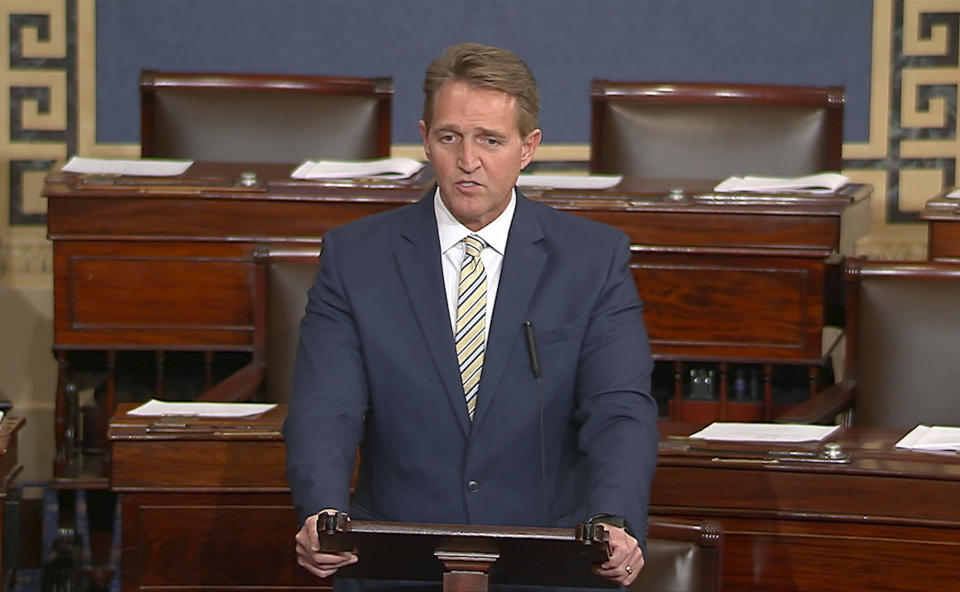Can Jeff Flake turn the tide in the Republican war on the media?
Since President Trump took office a year ago, much ink has been spilled over his unprecedented “war with the media.” The incessant refrain of “fake news,” repeated every time a story displeases him (and promoted via Trump’s own long-promised, long-delayed “Fake News Awards,” now scheduled for Wednesday night). The calls for boycotts, lawsuits and license challenges. The threat to “open up” libel laws. The descriptions of reporters and news organizations as “pathetic,” “scum,” “disgusting,” “very dishonest,” “failing” and even “the enemy of the American people.”
But while Trump’s hostility toward the press may be unusual in its intensity, vulgarity and openness, pretty much every president since the dawn of the republic has expressed some form of frustration with the institution — and over the last few decades, politicians of every rank, particularly Republican politicians, have found that trashing the media can be a very useful way to rile up their voters.
In other words, we’re sort of used to it at this point.
That’s why it was remarkable when, shortly after 10 a.m. Wednesday morning, Sen. Jeff Flake of Arizona, a Republican who has mostly supported Trump’s agenda, if not his manners, rose on the floor of the Senate to deliver a blistering rebuke of the media critic in chief — and a passionate, unapologetic defense of a free press.
“2017 was a year which saw the truth — objective, empirical, evidence-based truth — more battered and abused than any other in the history of our country, at the hands of the most powerful figure in our government,” Flake said. “The impulses underlying the dissemination of such untruths are not benign. They have the effect of eroding trust in our vital institutions and conditioning the public to no longer trust them. The destructive effect of this kind of behavior on our democracy cannot be overstated.”
Flake’s speech was so out of the ordinary, in fact — so unfashionable in its praise of the press — that it raised a previously unthinkable question: Could we be seeing the beginnings of backlash? Has Trump’s antimedia aggression forced at least some otherwise skeptical Americans to recognize that, despite its flaws, the media is more than just a political punching bag — that it actually has a vital role to play in our democracy?

In his remarks, Flake — a longtime Trump critic who announced in October in a similarly stern floor speech that he would not be running for reelection — catalogued the “most glaring” of the president’s “official untruths,” from his “bizarre contention regarding the crowd size at last year’s inaugural” to his “oft-repeated conspiracy about the birthplace of President Obama”; from his “pernicious fantasies about rigged elections and massive voter fraud” to the “supposed hoax at the heart of special counsel Robert Mueller’s Russian investigation.”
Flake went on to note that, in their own attempts to delegitimize unflattering coverage, a rogue’s gallery of repressive autocrats — Syrian President Bashar Assad, Philippine President Rodrigo Duterte, Venezuelan President Nicolas Maduro — have now taken to parroting Trump’s cry of “fake news” whenever the facts don’t suit them.
“This feedback loop is disgraceful, Mr. President,” Flake said. “Not only has the past year seen an American president borrow despotic language to refer to the free press, but it seems he has in turn inspired dictators and authoritarians with his own language. This is reprehensible.”
Finally, Flake chastised his Senate colleagues for ignoring Trump’s efforts to undermine the First Amendment — and demanded that they, too, speak out in the future.
“No longer can we compound attacks on truth with our silent acquiescence,” Flake said. “Together, my colleagues, we are powerful. Together, we have it within us to turn back these attacks, right these wrongs, repair this damage, restore reverence for our institutions, and prevent further moral vandalism. Together, united in the purpose to do our jobs under the Constitution, without regard to party or party loyalty, let us resolve to be allies of the truth — and not partners in its destruction.”

In response to Flake’s broadside, White House spokeswoman Sarah Sanders told reporters that Flake was “not criticizing the president because he’s against oppression; he’s criticizing the president because he has terrible poll numbers” and is “looking for some attention.”
It’s unlikely, of course, that Flake’s fellow Republicans will echo his comparison of Trump to Soviet dictator Joseph Stalin, who, as Flake pointed out, also applied the phrase “enemy of the people” to anyone he wanted to get rid of. After Flake spoke, two senators — Dick Durbin of Illinois and Amy Klobuchar of Minnesota — stood to applaud and second his remarks. Both were Democrats.
Nor is it likely that Trump’s base will desert him over an issue as abstract as the First Amendment. Our politics are too tribal for that; Trump voters love when he attacks “elite” East Coast institutions, the media chief among them.
But what about the millions of other Americans like Flake, uneasy with Trump but hardly liberal, wary of the media’s biases but cognizant of its central constitutional role? Could Trump’s rancor toward reporters backfire with that group?
The press itself is banking on it. As Vox’s Matt Yglesias has pointed out, “what’s particularly striking about Trump’s relationship with the mainstream press is the extent to which the pretense of an oppositional relationship with the White House has become a marketing tool.”
Yglesias continues:
“CNN’s ‘facts first’ branding campaign, rolled out last fall, was pitched to the press as an effort to “blunt Trump attacks” on the network. … The Washington Post, similarly, newly adopted the slogan ‘Democracy Dies in Darkness’ last year, pitching reading the Post not only as a way to be informed or entertained but also as a form of civic duty and obligation. [And] The New York Times, a for-profit, publicly traded company, last year began soliciting money from readers with a quasi-charitable pitch, emphasizing the idea that buying gift subscriptions is a means of supporting the company’s ‘mission.’”
There are signs that the media’s Trump-era rebranding campaign is working. Subscriptions and traffic at both the Times and the Post hit record highs in 2017, and Steven Spielberg’s The Post, a movie that dramatizes that paper’s decision to defy another hostile administration by publishing the Pentagon Papers, has beat box-office expectations.

Yet if Flake truly intends to counter Trump’s “fake news” onslaught, he still has a long way to go — especially if he wants the backlash to include members of his own party. According to a new Knight-Gallup poll, a majority of Americans consider “fake news” a very serious threat to our democracy, and 73 percent say the spread of inaccurate information on the internet is a major problem with news coverage today.
But the poll also showed that Republicans and Democrats disagree over what actually constitutes “fake news.” For Democrats, the term tends to mean untrue stories. For Republicans, it tends to mean “unfriendly” ones, with four in 10 claiming that accurate reports that nonetheless cast a politician or political group in a negative light can “always” be dismissed as fake news. As a result, trust in the press has sunk to an all-time low among Republicans.
In 1976 — after Watergate and Vietnam; after the Pentagon Papers and “All the President’s Men” — 72 percent of Americans told Gallup that they had either “a great deal” or “a fair amount” of trust in the mass media. Those days are almost certainly never coming back.
Still, on Wednesday, a sitting Republican senator took an unconventional step. He argued that restoring at least some of that trust is essential — and that his own party’s president should stop working to further erode it. The question now is whether other Republicans bother to amplify Flake’s message — or whether it gets simply gets drowned out by Trump’s latest antics.

In the meantime, the media itself would be wise to follow the advice of the late Washington Post editor Ben Bradlee, whom Tom Hanks is currently portraying on screen in The Post.
“We hunker down and go about our business,” Bradlee once told an interviewer who asked how he handled criticism. “Which is not to be loved — but to go after the truth.”
_____
Read more from Yahoo News:



